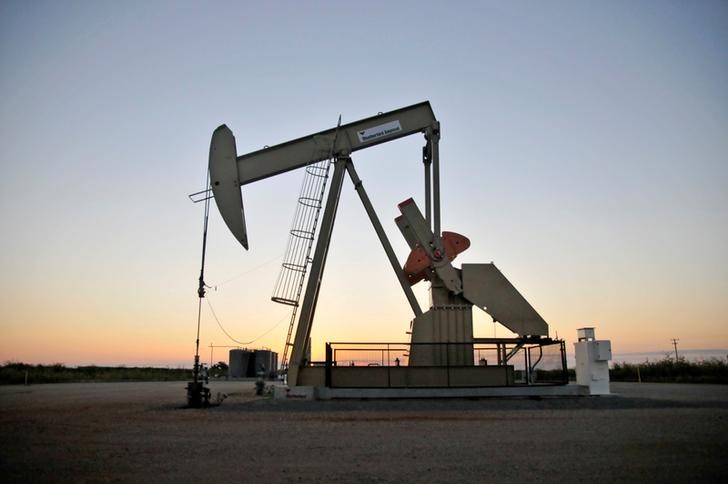By Stephanie Kelly
NEW YORK (Reuters) - Oil prices rose on Wednesday, supported by both a drop in U.S. crude inventories as well as a loss in Libyan supplies, but were under pressure ahead of an OPEC meeting that may increase global production.
Brent crude futures for August delivery (LCOc1) inched up 33 cents, or 0.4 percent, to $75.41 a barrel by 11:50 a.m. EDT (1550 GMT).
U.S. West Texas Intermediate (WTI) crude futures for the July contract (CLc1), which expires on Wednesday, rose $1.27, or 2 percent, to $66.34 a barrel. WTI futures for August
U.S. crude oil stockpiles dropped sharply last week while gasoline and distillate inventories grew as refineries' crude runs rose to their highest on record seasonally, the Energy Information Administration said.
U.S. crude inventories
"What you've continued to see here is maintenance season continues to wind down for the refinery sector, so that obviously bodes well for continued crude oil demand," said Nick Holmes, an investment analyst on the energy portfolio team at Tortoise Capital in Leawood, Kansas.
Traders said a drop in Libyan supplies, including the loss of a 400,000-barrel storage tank, also helped push up prices.
Libya's oil output has been slashed to between 600,000 and 700,000 bpd from more than 1 million bpd following clashes at its Ras Lanuf and Es Sider oil terminals, a Libyan oil source said.
An attack by armed factions opposed to Khalifa Haftar's Libyan National Army (LNA) has forced the closure of the two ports since June 14 and the declaration of force majeure on exports.
Looming large over markets, however, were meetings scheduled on June 22-23 in Vienna for the Organization of the Petroleum Exporting Countries and other big producers, including Russia.
Saudi Arabia is trying to convince fellow OPEC members of the need to raise oil output, sources familiar with the talks said on Wednesday.
Russia, which is not a part of OPEC but is the world's biggest oil producer, is also pushing to loosen supply controls introduced to prop up prices in 2017.
Other OPEC members, including Iran, oppose such a move, fearing a price slump.
Iran signaled it might allow a small increase in OPEC oil output, letting some OPEC members that had overdelivered on cuts return to compliance with quotas.
That would effectively mean a modest boost from producers such as Saudi Arabia that have been cutting more deeply than planned despite production outages in Venezuela and Libya.
"The run-up to this OPEC meeting is fraught with uncertainty with Iran from the onset adopting a very entrenched opposition to any supply increase," Harry Tchilinguirian, head of oil strategy at French bank BNP Paribas (PA:BNPP), told Reuters Global Oil Forum.
Markets are also watching tension between the United States and China, with both sides threatening to impose duties on each other's exports, including U.S. crude oil.
China has threatened a 25 percent tariff on U.S. crude oil imports, which would make U.S. crude less competitive in China versus other supplies.

This could lead to a sharp drop-off in Chinese purchases of U.S. crude, which have boomed in the last two years to a business now worth around $1 billion per month.